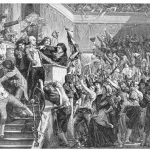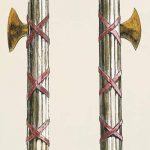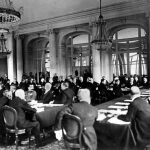The first George (1660 – 1727) was a German-speaking Elector (royal rank) of Hanover. How did a German come to be invited to be King of England? Not only that, but found a dynasty named after Hanover? George’s mother was Sophia (died 1714), granddaughter of James I, King of England (and VI of Scotland). Sophia’s children were recognised as heirs to the English throne in an Act of Settlement (1701); this Act was specifically designed to keep Roman Catholics off the throne, and the Electors of Hanover were Protestants. James Stuart had been protestant too, though his son Charles I (executed by Parliament) could be described as a kind of Anglo-Catholic, while his brother James II was wholly Catholic, driven off the throne for religious reasons. The wives of all three, James I, Charles I and James II were Catholic.
George was summoned from Hanover on the death of the English Queen Anne in 1714. It was difficult for both Court and Government to communicate with him, because he spoke not a word of English, but everyone muddled through somehow, in French, which the French insist no English person can speak. A Scottish Jacobite rebellion in the north was dealt with by George without his usual urbanity, and his firmness impressed the English. It was a good beginning.
The new king had little or no sympathy for the English idea of constitutionalism (which constituted in not having a constitution), the English laid-back system of parliamentary politics, or the country itself. He disliked England from the moment he set foot in it, and made no bones about it. When the disdain he felt became too strong, he spent long periods back in Hanover, which he loved. Odd to relate, he took most of his classes in the England language in Hanover, not in England. There he learnt enough to get by, though his strong German accent stayed with him until death. Scurrilous cartoons drawn of George I at this time are full of “Ach Got!” and “Donner und Blitzen” and “Vot vos dot you said?”
He trusted Prime Minister Walpole however, supporting him and the Whigs. He reigned as a king without a queen, as he had divorced his wife Sophia Dorothea in 1694. Still muttering in German, he died in 1727, having ruled for thirteen years.
His son George (1683 – 1760) became King of England (and Elector of Hanover) in 1727. This George disliked and resented his father, and the feeling was mutual. It became a tradition for Hanoverian kings not to get on with their sons, and vice-versa. The new king could not forgive his father because of the cavalier treatment of his mother, Sophia Dorothea.
George II’s marriage to Princess Caroline of Ansbach was as successful as any arranged marriage can be, and it was Caroline who tactfully but firmly persuaded her husband to accept Walpole’s judgment as his chief minister.
His temper was violent, and people near him kept their thoughts to themselves; it was George who commanded the Admiralty to execute poor Admiral Byng after he had lost Minorca in a naval engagement. Of course he was hardly on speaking terms with his son Prince Frederick Louis.
It is worth making a careful note of the fact that George II was the last King of England to lead his troops into battle, at Dettingen in 1743. George was supporting the Empress Maria Theresa during the War of the Austrian Succession. He survived the fighting, but disliked his Prime Minister Pitt the Elder (qv). He also tried to keep him out of office, though the wily Pitt knew enough of politics to stay there. When at last George came to terms with Pitt, things looked much brighter for England, and the near-friendship reached its height with English successes in the Seven Years War. George II spoke English not perfectly, but well.
George’s grandson, the son of Frederick Louis, became King George III King of Great Britain and Ireland, dependencies oversea and Elector of Hanover (1760). This George has always had a bad press because he is said to have lost the American Colonies for England. Though it is difficult to believe, there are still many true-blooded Americans who like their ancestors, would have preferred the Colonies to stay British. This is not the time to debate the truth of this conceit, but suffice it to say that not ALL the settlers in the thirteen Colonies agreed with George Washington and his friends’ independent and imperial ambitions. There is an old saying in Massachusetts that only “The Signers” (of the Declaration of Independence) would have died for it. Many colonists were nonchalant about the whole affair.
George III was a comparatively good husband, a devoted family man (though a strict father) and had ironclad convictions about the role of a monarch. He knew a lot about fine art, and built up the royal collections (founded by the Stuarts) assiduously and with good taste. What he disliked intensely was Whig power. There were a few extremely powerful Whig families surrounding the throne and ‘molesting’ the Court, and George did not conceal his disdain for them. The King chose to put himself above politics therefore, which is the reason for a succession of feeble ministries from 1760 to 1770, precisely at a time when strong ministries might have dealt with the American question without loss of blood, colonies or prestige.
This George could not bring himself to agree with any of the Colonists’ demands, requests or pleas. He shared with the majority of his people a loathing of the their demand for independence. It was around this time that the Court and physicians began saying their King was mad. He went into sulks, was a prey to appalling headaches, and endured nightmares while awake. In fact George was suffering from porphyria – undiscovered then. Physicians subjected the King to the most torturous and barbarous ‘treatments’ including daily drinking of urine. We know now that porphyria is a metabolic ailment that causes mental disturbance.
In 1765 plans were made for a regency government, as it appeared the King had gone insane. He made ‘miraculous’ recoveries however (a revealing symptom of porphyria) and the only regency council worthy of that name lasted from 1788 – 89.
Politically, the King believed in interference from above, not in ‘partnerships’ with his Prime Minister, in this case the brilliant Pitt the Younger (qv). When George refused utterly to consider Catholic emancipation to counterbalance the Act of Union with Ireland, Pitt shocked him by resigning. Meanwhile the mental disturbances continued, though the King was nursed night and day by his loving wife and consort, and a series of male groom/nurse servants who adored the poor man. In his saner moments, he showed considerable humour by referring to himself and his wife as “Mr. and Mrs King”.
It was no good, however, and the arrival of deafness and blindness forced the Government to set up the Regency in 1811. The Prince Regent was a profligate wastrel, certainly no better than he should be, fat, unprincipled and the target of most newspapers’ worst venom in their political cartoons. He was also the King’s son, and true to tradition the son hated the father just as much as the father loathed (and distrusted) the son.
George IV (1762 – 1830) was King of Great Britain and Ireland and dependencies overseas (the British Empire was rapidly expanding and required careful handling as well as exploitation). He was also King (note the different title) of Hanover. As Regent and later King he lived a dissolute and perhaps shameful life, and it is a tribute to British spirit that he did not cause a revolution on similar lines to the French example. The new George had disliked his father, who in many ways had been the best of the Hanoverian kings of England.
It has often been said, and it is probably true, that George IV supervised the decline in power and prestige of the British monarchy, though the Napoleonic Wars took place during Hanoverian reigns, and Napoleon had finally been beaten (and hidden away in St. Helena) in 1815.
George had married a Catholic lady called Maria Fitzherbert in 1785, but ten years later he was forced to make a state marriage with Caroline of Brunswick. He had become so English, unlike his father, grandfather and great grandfather, that he now had to explain himself to his consort in bad German. There is irony in everything.
George waited until Caroline had given birth to their only child (Princess Charlotte) before separating from her. He argued with and insulted both Whigs and Tories in Parliament, losing whatever influence he might have had in his own government. At least Parliament saw through, at last, The Catholic Emancipation Act of 1829. Not satisfied with being almost the most unpopular man in Britain, George tried to make his mere separation from Caroline a divorce in 1820. He was a leader of fashion (among men), a personal friend of Beau Brummell, and the creator of the hideous Brighton Pavilion as well as the chief inspiration for the beautiful and distinctive spa towns of Bath and Cheltenham. On his death in 1830 he was succeeded by his brother, ‘The Sailor King’ William IV.









Leave A Comment